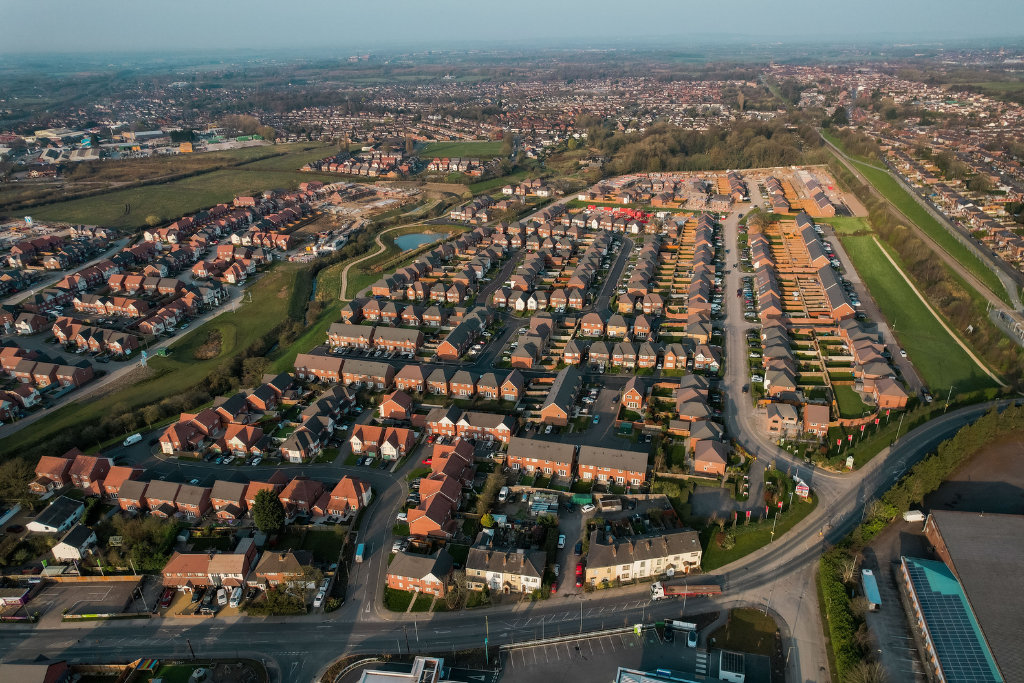
I Cant Sell My Flat: Need to Sell Fast UK
In this blog post, we will be looking at why flats are hard to sell, how you can sell your flat quicker, and how we can help you sell fast and for free.

Alexandra Ventress ★ Digital Content Writer
Table of Contents
Selling your flat can be difficult and as a seller in the dynamic world of property, you may find that you require a faster sale that you originally anticipated. Whether it’s due to financial constraints, a change in personal circumstances, or the need to relocate urgently, selling your flat swiftly can be a daunting task.
In this blog post, we will be looking at why selling a flat takes so long, how you can make your flat sell quicker, and how to sell your flat in as little as 28 days.
Looking for a quick answer? Check out our interactive menu to the left!
Sell your flat quickly and without the hassle
Why does selling a flat take so long?
There is no one size fits all answer to this question. Exactly why your flat is languishing on the open market could be down to a variety of factors such as issues with supply and demand, your flat location, property price, proximity of amenities, and the personal circumstances of your potential buyer. If you are worried about your flat languishing on the open market, there are steps you can take to help it sell quickly. Just check out our blog post here!
Why are flats so hard to sell?
Exactly why your flat may be taking so long to sell can depend upon a variety of different factors that have moulded the open market over the last few years. Below we take a closer look at what these are and how they can affect your ability to sell.
Market Conditions
The conditions of the market can have a huge effect on property sales. If there is a slow or downturn market then you may find it difficult when it comes to selling your flat.
Location
Another crucial factor in flat sales is the location. Undesirable or less popular areas make attracting buyers difficult and the proximity to amenities, transportation, schools, and safety influences marketability.
Maintenance and Condition
It is no secret that buyers prefer well-maintained properties. Flats needing extensive repairs are less appealing and potential buyers may hesitate due to additional costs.
Limited Outdoor Space
The downside to flats is they often lack outdoor space. So as a result, buyers prioritising yards or gardens may find flats less appealing.
Association Fees
Some flats are part of homeowners’ associations (HOA). Whilst this can be a good thing, high association fees can deter potential buyers and may impact the overall marketability of the property.
Perception and Lifestyle Preferences
There are some buyers who hold preferences for traditional houses over flats. They can be influenced by perceptions of space, privacy, and ownership and these lifestyle preferences play a significant role in flat demand.
Why are flats not selling at the moment?
Exactly why your flat may be taking so long to sell can depend upon a variety of different factors that have moulded the open market over the last few years. Below we take a closer look at what these are and how they can affect your ability to sell.
Interest rates in the UK have been increasing, resulting in elevated mortgage costs for potential buyers. As a result of the changes brought about by these rising costs, there has been a decline in demand, especially for flats, as individuals perceive borrowing money to be a more expensive endeavour than it was previously.
The Bank of England’s choice to raise interest rates has been influenced by diverse economic factors, such as managing inflation and stabilising the currency. This means heightened monthly mortgage payments for prospective homeowners, which has the potential to potentially dissuade them from pursuing homeownership. The impact is particularly pronounced for first-time buyers, with increased costs rendering homeownership unattainable for a significant number.
The economic uncertainty experienced in 2023 is extending into 2024 and continues to influence consumer confidence. Individuals are exhibiting hesitancy in property investments due to the perceived unpredictability of the future, which in turn has a knock-on effect and impacts the property market.
Persistent concerns regarding the global economy, political instability, and potential alterations to tax laws and regulations contribute to this prevailing uncertainty. Prospective buyers are inclined to postpone significant financial commitments, such as purchasing a flat, in light of this uncertainty. This reluctance to invest has led to a sluggish market characterised by a reduced number of buyers and sellers, ultimately contributing to a decline in property values.
Challenges related to supply and demand often arise when new housing developments saturate the market with similar properties, causing a decline in the value of neighbouring flats. This surplus of options results in heightened competition among buyers, making it more difficult to sell flats at favourable prices. Sellers may find themselves engaged in bidding wars, having to reduce prices in order to attract interest.
Furthermore, the property demand landscape is significantly influenced by location. Flats situated in sought-after areas, where housing availability is limited, tend to draw increased interest. The scarcity of available properties in these prime locations can lead to higher prices and a shorter time on the market. While selling a flat in these areas may grant you a smoother selling process, these high-demand locations are relatively scarce. In practical terms, flats are more commonly favoured in city settings and proximity to amenities, yet even in these scenarios, selling can be challenging if the market is subdued.
The desire for personal outdoor space, initially fueled by COVID restrictions, continues to be a prevalent trend post-pandemic. Many flats lack significant outdoor areas, limiting their appeal. Additionally, the surge in the popularity of flexible working has prompted individuals to relocate from cities in search of more space for their budget. The cost of a city flat could be invested in a small house outside the city, providing garden space and a home office. Although some businesses advocate for a full-time return to the office, the enduring appeal of flexible/hybrid working motivates buyers to consider living outside the city, as commuting to the office once or twice a week is often feasible for many.
Mortgage interest rates experienced a significant surge throughout 2022 and 2023, propelled by the rising BOE base rate. You can observe the upward trajectory in this graph. The base rate, which remained at 0.1% for much of 2020 and 2021, has now surpassed 5%. It’s important to note that the base rate reflects the rate at which your local bank borrows money from the Bank of England. Your local bank then applies its mark-up to this rate before selling the mortgage to you. Consequently, depending on the loan-to-value ratio, you could be paying substantially more than the base rate.
What is a shared ownership flat?
If you are unable to afford a deposit and mortgage payments for a property, you may be able to purchase a house or flat through shared ownership. This involves purchasing a share of between 10% to 75% of the home’s full market value and paying rent to a landlord for the share they own of the property.
Over time, you can purchase more of the shares from your landlord, eventually paying less rent and more towards your mortgage, until you own a 100% share of the property. You are able to sell a shared ownership property at any time, however your method of selling can be dependent on your shares.
If you own 100% of the property, then you can sell your property however you wish. However, if you do not own 100% of your property, then you must alert your landlord when you wish to sell, allowing them time to find a buyer for your share.
If your property has a ‘designated protected area-mandatory buyback’ lease, then you will not be able to sell your home on the open market. In this situation, either your landlord will purchase your share or they will arrange for someone else to do so.
Sell your flat in as little as 28 days
I cant sell shared ownership flat, what do i do?
Once you have alerted your landlord of your intention to sell, they will have a nomination period to find a buyer. This period will usually be either 4, 8, or 12 weeks, depending on the lease. If your landlord is unsuccessful in finding a buyer during this period, then you will be able to find a buyer for your property yourself.
If you cant sell shared ownership flat, then don’t worry, there are steps that you can take to help:
If you are struggling to sell your shared ownership property, then you should reach out to your housing association. They may be able to offer you advice, guidance and support. Some even have a process in place if you are unable to find a buyer.
Obtain a professional valuation for your property. This will help you determine an accurate and competitive asking price, which can be crucial for attracting potential buyers.
Evaluate whether there are any improvements or repairs that could enhance the appeal of your shared ownership flat. Small upgrades or improvements may make the property more attractive to potential buyers.
Ensure that your property is effectively marketed. Utilise online platforms, social media, and other channels to reach a wide audience. Highlight the benefits of shared ownership and any unique features of your flat.
If you encounter legal or contractual challenges, consider seeking legal advice. A solicitor experienced in property law can help navigate any complexities and ensure that you meet all legal requirements.
Or, you can bypass the hassle and get in touch with us. We can help you sell your home in as little as 28 days and without fees! Interested? Click the box below for more!
Can I pull out of selling my flat?
As is the case when selling any property, you are able to pull out of a sale at any point before the exchange of contracts without legal consequence. However, if you wish to pull out once the contracts have been exchanged, then you will be breaking a legal contract, and you can expect to face legal consequences as a result.
If you are considering pulling out of a house sale or purchase, you should consider the potential implications that can be incurred as a result:
- The buyer losing their deposit
- Being taken to court to cover losses as a result of the terminated sale/purchase
- Losing out on non-refundable costs, such as conveyancing costs
How can I make my flat more sellable
I cant sell my flat, is there anything I can do?
If you are looking to speed up your property sale and secure a fast flat sale, then one of the best ways that you can do this is by bringing the interior of your flat up to scratch. You don’t need to go all out with renovation, despite what you may have been told. Whilst renovations are great, if you are selling on a timescale, the chances of the changes you make being ready in time are slim to none. Furthermore, the money you spend on these renovations is unlikely to be made back in the sale. Only consider renovations if there is drastic work that needs to be done, or you are likely to stay living in the flat for quite some time so will be able to enjoy the new amenities.
So, what can you do?
Thankfully, there are smaller changes that you can make that are likely to have a big impact on your sales. For example, some quick wins that you can achieve quickly before your estate agent arrives include:
This means hoovering, wiping down any and all surfaces, cleaning the kitchen and bathroom, emptying the bins, and giving the flat a general once over. A tidy home is a loved home, and potential buyers will be able to pick up on this.
Before you host any viewings or allow the estate agent round, you should clean up any communal areas within your building to ensure they are looking their best. You should speak to the property managers or even your neighbours about this as first impressions matter, and you want to WOW any potential buyers before they even see the flat.
Around an hour before any visits or viewings you should open the curtains and windows in your flat to let in fresh air and natural daylight. This will help to rid the flat of any odours as well as help the flat to seem airy and bright.
Before any viewings or visits, you should give your flat a once over to ensure there is no clutter left lying about. This means no clothes horses left out, no washing up on the side, beds made and nothing left out on the side.
It is always a wise idea to try and arrange viewings for quieter times during the day. This will help to paint both your building and your flat in the best light as it lowers the chance of any loud noises or neighbours being an issue.
How can I speed up my flat sale?
If you are looking to speed up the sale of your flat, there are a couple of steps you can take to help ensure that you are selling quickly and to a timescale that suits you. Below, we take a look at some of our top tips for a quick flat sale:
Stay organised and proactive
In order to ensure that your sale is running as smoothly and efficiently as possible, it’s important to stay proactive throughout. This means staying well informed about not only the tasks at hand but also their respective deadlines. Understanding what needs attention and when helps you stay ahead of any potential delays.
Communicate
Communication is key in life, and a property sale is no different. If you want to speed up the sale of your flat, you will need to ensure that you keep in touch with both your estate agent and solicitor consistently throughout the process. This will minimise the risk of miscommunication but also will mean that as soon as a document or an issue crops up, you will be able to deal with it swiftly and keep your sale on track. You may wish to consider establishing a weekly update routine among all involved parties in order to keep the line of communication open.
Establish a realistic completion date
You should set a practical target date for the exchange of contracts. This will create a shared deadline for all of the involved parties and will allow you a goal to work towards. If there’s no urgency for your sale, allow some extra time between the exchange and completion rather than being overly flexible with the exchange date.
Sell through The Property Selling Company
One of the best ways you can sell your flat quickly is through us. We can help you sell your flat in as little as 28 days and without the fees. Want to find out more? Click here!
What to do if you can't sell flat?
If i cant sell my flat, what am I meant to do?
If you are struggling to find a buyer for your flat don’t worry. We are The Property Selling Company, an estate agency with a difference. We pride ourselves on our personal philosophy that selling a flat should be three things, fast, effortless, and free.
Our dedicated team of property professionals are by your side throughout the selling journey, guiding you every step of the way. From valuation to listing and through to completion, we handle all aspects of the selling process, tailored to your unique selling situation. We offer a full estate agency service, but without the expensive estate agent and legal fees you have come to expect.
Say goodbye to the days of struggling for a buyer for your flat. All you need to do to get the ball rolling is fill in one of our no-obligation forms below and start your house-selling journey today.
Sell your flat without hassle









